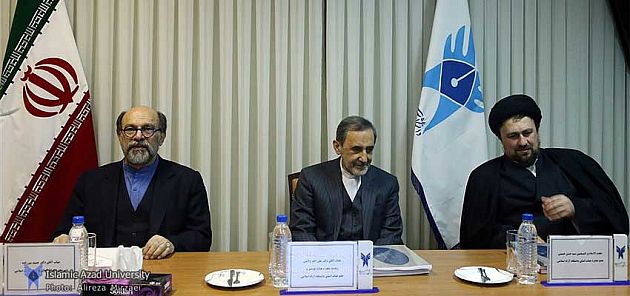Saturday 3 June 2017 - 15:31
Story Code : 263493
Knowledge, Wealth, Power: The battle over Iranís largest academic institute continues
Iranian Diplomacy- A political dispute over Iranís Islamic Azad University, the largest non-profit university of the country and one of the legacies of the late Ayatollah Hashemi Rafsanjani, is brought into the foreground, right after the recent presidential election.
Though the abrupt dismissal of the university's chancellor Hamid Mirzadeh turned many heads amid the zeal of the presidential race, it did not receive any thorough investigation in Iranian media outlets. However, with the dust of the presidential race gradually settling, fresh details are released about ongoing intense infightings. The chairman of the board of trustees, former foreign minister Aliakbar Velayati, has accused the recently dismissed director of the university and his family members of financial corruption in the institute. The claims were denied in turn by Mirzadeh, who has issued a statement calling on Velayati to join an open debate on the matter.
Following the upset demise of heavyweight and founder of university Ayatollah Hashemi Rafsanjani, Iran's Supreme Leader Ayatollah Ali Khamenei appointed Velayati as the chairman of the founding board as Hashemi's successor. Most observers believed Velayati, a figure regarded close to Hashemi Rafsanjani, would not change the university's main policies, hence its chancellor. It did not take long for the supposition to prove wrong, when the universityís deputy director for cultural affairs Taha Hashemi resigned on March 11, which Mirzadeh accepted. Commenting on the resignation, the IRGC-affiliated Tasnim news agency hailed Velayati's appointment as a harbinger of change, adding that Taha Hashemi Ďwas not prepared for the upcoming improvementsí.
On April 23, an extraordinary session of the university's board of trustees decided to fire director Mirzadeh. According to Tasnim, the session, called upon the request of four members, voted unanimously for the ouster. Though the four members were not named, the report added that higher education and healthcare ministers, two of the legal personality members, had left the session after discussing their views, while the meeting continued with seven other members.
Rumors that started circulating in the unofficial sphere indicated financial issues. Replacements in the university did not seem to end. On Sunday, son of Ayatollah Hashemi Rafsanjani, Yaser, was fired from his position as the board of trustees' bureau chief. This jumpstarted reaction in the media, seeing the decision as part of a ďde-Hashemization projectĒ.
On Monday, Hassan Khomeini, the grandson of the Islamic Republic's founder and first Supreme Leader Ayatollah Ruhollah Khomeini, wrote a letter to President Hassan Rouhani, which further complicated the situation. Hassan Khomeini, also a member of the founding board and the board of trustees, called Mirzadeh's dismissal as either lacking legitimacy or at least very suspicious. Some observers viewed Hassan Khomeini himself as a potential successor to Hashemi Rafsanjani in the university.
A day later, hardliner Kayhan daily published an interview with Velayati that further escalated the tensions. Velayati has told Kayhan that an inspector of the university had informed Ayatollah Hashemi Rafsanjani of several cases of financial corruption, and that the heavyweight had demanded Mirzadehís dismissal 'after the presidential election'.
Illuminating on examples of the corruption, Velayati had mentioned 'intervention by Mirzadeh's children into the university's affairs and major financial contracts', saying evidence of such interventions is available. "For instance, one of Mr. Mirzadeh's children had required local branch deans to sign a contract with a certain company and a refusal would disgrace them for Mr. Mirzadeh," Velayati added. Velayati said one contract of the kind was partnership in a pharmaceutical factory worth over 200 billion tomans (approximately $50m), which he ordered to stop, as soon as he was informed.
Velayati went on to respond to doubts shed on Mirzadeh dismissal, saying the extraordinary session was attended by all the nine members of the board of trustees, and the session continued after healthcare and science ministers left, with all the other seven member, including Hassan Khomeini and Mirzadeh. According to Velayati's account of the story, when the remaining five voted for Mirzadeh's dismissal, Khomeini and Mirzadeh left, and the other five decided the appointment of the new head.
Mirzadeh has responded to the allegations, issuing a statement that in turn blames the accusations on branch deans that have been fired by him over corruption or administrative and educational violations. The statement also called on Velayati to publicize the so-called documents of his corruption.
The Islamic Azad University's deputy director for parliamentary affairs has told reporters that evidence of violations committed by Mirzadeh and his offspring is handed to the judiciary. In the meantime, Velayati has told state-run TV that an independent audit institution has been asked to probe the university's previously uninvestigated financial records from the past 35 years. According to Velayati, the university's wealth exceeds $250b and its current annual budget is $2.6b.
The recent developments spearheaded by Velayati seems to have been favorable to the Principlist camp, who once viewed Velayati as an agent of Hashemi Rafsanjani who caused their defeat in the 2013 presidential race, as he refused to withdraw in favor of other Principlist candidates, Saeed Jalili and Mohammad-Bagher Qalibaf. One tweet sums it all: "Velayati woke up and his hand hit Hassan Khomeini's mouth as he was stretching. This way, I won't get confused with Velayati's response to his letter".
# Tags











